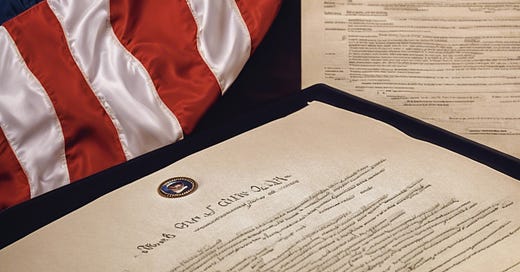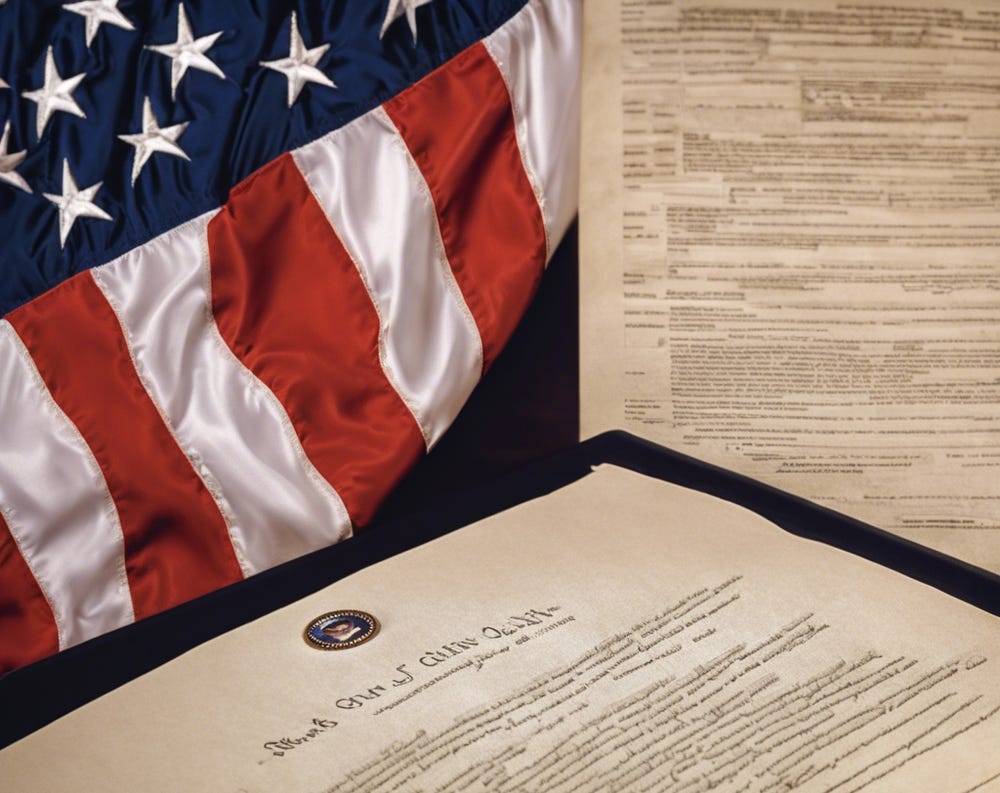I began working on this a few days back, jotting down some ideas, and I believe it's where I want it to be. I'm not a Constitutional Lawyer, just an avid reader (If you recognize the quote and its source, we could be best friends!) Thanks to Kim for pushing me to post this one - it's "Your damn blog, write what you want."
Recently, discussions about patriotism and national duty have intensified. The oath of office, sworn by federal employees, military personnel, and elected officials, has become a focal point of significant debate. Some individuals are even labeling the current U.S. government as "the enemy," not just targeting the leaders but the entire system. To me, that’s a major misunderstanding of the oath. It's akin to calling the referee the enemy simply because you disagreed with a decision. Let's delve into what the oath is truly about.
The Oath of Office: A Commitment to the Constitution (Not to Your Political Party)
The oath of office is pretty straightforward—if you’re into legalese, that is. For federal officials, it goes like this:
"I do solemnly swear (or affirm) that I will support and defend the Constitution of the United States against all enemies, foreign and domestic; that I will bear true faith and allegiance to the same; that I take this obligation freely, without any mental reservation or purpose of evasion; and that I will well and faithfully discharge the duties of the office on which I am about to enter. So help me God."
Notice something important here? It’s not a pledge of loyalty to a political party, a celebrity figure, or even the government itself. Nope. This oath is a promise to support and defend the Constitution—the very thing that holds everything together, even when the rest of us are out here losing our minds over the latest political drama. The Constitution is the framework, the foundation. It’s the one thing that’s supposed to keep us from going full “wild west.”
When someone swears this oath, they’re committing to the system. They’re agreeing to respect the presidency, Congress, and the courts—even if they can’t stand who’s in charge at the moment. The administration isn’t the enemy—it’s a part of the system, doing what the Constitution asks of it, for better or worse. And trust me, it's often worse. But that's democracy, folks. Deal with it.
A False Narrative: The Government Is Not the Enemy (No, Really)
Let’s talk about this "enemy" thing for a minute. Some people have started calling the U.S. government, and especially the current administration, "domestic enemies." Which, well, is a bit of a stretch. The term "domestic enemies" in the oath actually refers to those who want to overthrow or destroy the Constitution—not those who are just running the show within it.
I don’t know about you, but I’ve been taught that the Constitution has this neat little thing called checks and balances. You know, like when your buddy says something totally ridiculous at the bar, and you step in with a little reality check. In government, these checks include:
Congressional oversight and impeachment (when things get really off the rails)
Judicial review (when courts say, "Hold on a second, that’s unconstitutional")
Elections (because apparently, we vote people in and out, not just throw them out the window when we don’t like them)
So, calling the government the "enemy" just because you disagree politically? That's ignoring all of these tools, which are designed to help us peacefully resolve our differences. It’s like complaining about the refs in the game when you don’t even understand the rules. Disagreeing with the government doesn’t make it the enemy. It just means you’re in the midst of a very long and frustrating argument.
The Duty to Country: Governance is Participation, Not a Coup
Now, here’s the deal. The oath doesn’t give anyone the power to decide who’s the enemy based on their personal feelings. The oath isn’t about throwing up your hands and saying, "Well, I don’t like that guy, so he’s the enemy." It’s about upholding the processes and institutions that the Constitution set up. It’s not about a cult of personality or loyalty to some political ideology. It’s about respecting the system.
And let’s be clear—governance isn’t about sitting on the sidelines and complaining. It’s about participation, debate, reform, and accountability. It’s not about giving in to chaos and calling for a revolt because your guy didn’t win. To defend the Constitution means respecting the authority of elected leaders—even if they’re the last people you want to see on TV. The real enemy? It’s lawlessness. It’s chaos. It’s throwing out the system that’s designed to protect us all.
Conclusion: The Oath is About Responsibility (Not Blowing Up the Whole Thing)
In the U.S., we’ve built a system where disagreements are supposed to be handled legally and peacefully—not by grabbing a pitchfork and storming the gates. The oath of office is a promise to keep that system intact. It’s not an invitation to tear it all down when things don’t go your way.
People manipulating the oath to suit their personal objectives misunderstand its purpose and harm the constitutional framework they profess to protect. The genuine responsibility of anyone who takes the oath is to uphold the system that permits disagreement while also fostering unity once conflicts are resolved. This involves accepting election outcomes, adhering to the law, and participating in the democratic process, rather than reacting destructively or attempting to undermine it.
Patriotism isn’t about tearing down the government just because you disagree. It’s about ensuring that disagreements are handled within the system held up by the very oath we all swear to defend. And if we all do that, maybe—just maybe—we’ll figure out how to make this whole democracy thing work a little bit better.





Something I always took very seriously and still do…